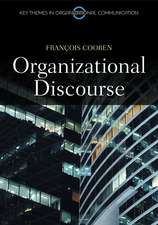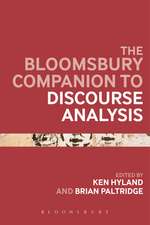The Language of Fear: Communicating Threat in Public Discourse
Autor Piotr Capen Limba Engleză Hardback – 23 noi 2016
This book investigates linguistic strategies of threat construction and fear generation in contemporary public communication, including state political discourse as well as non-governmental, media and institutional discourses. It describes the ways in which the construction of closeness and remoteness can be manipulated in the public sphere and bound up with fear, security and conflict. Featuring a series of case studies in different domains, from presidential speeches to environmental discourse, it demonstrates how political and organizational leaders enforce the imminence of an outside threat to claim legitimization of preventive policies. It reveals that the best legitimization effects are obtained by discursively constructed fear appeals, which ensure quick social mobilization. The scope of the book is of immediate concern in the modern globalized era where borders and distance dissolve and are re-imagined. It will appeal to students and researchers in linguistics, discourse analysis, media communication as well as social and political sciences.
| Toate formatele și edițiile | Preț | Express |
|---|---|---|
| Paperback (1) | 442.44 lei 6-8 săpt. | |
| Palgrave Macmillan UK – 23 iun 2018 | 442.44 lei 6-8 săpt. | |
| Hardback (1) | 448.58 lei 6-8 săpt. | |
| Palgrave Macmillan UK – 23 noi 2016 | 448.58 lei 6-8 săpt. |
Preț: 448.58 lei
Nou
Puncte Express: 673
Preț estimativ în valută:
85.85€ • 93.22$ • 72.11£
85.85€ • 93.22$ • 72.11£
Carte tipărită la comandă
Livrare economică 22 aprilie-06 mai
Preluare comenzi: 021 569.72.76
Specificații
ISBN-13: 9781137597298
ISBN-10: 1137597291
Pagini: 94
Ilustrații: XII, 91 p. 5 illus.
Dimensiuni: 148 x 210 x 12 mm
Greutate: 0.28 kg
Ediția:1st ed. 2017
Editura: Palgrave Macmillan UK
Colecția Palgrave Macmillan
Locul publicării:London, United Kingdom
ISBN-10: 1137597291
Pagini: 94
Ilustrații: XII, 91 p. 5 illus.
Dimensiuni: 148 x 210 x 12 mm
Greutate: 0.28 kg
Ediția:1st ed. 2017
Editura: Palgrave Macmillan UK
Colecția Palgrave Macmillan
Locul publicării:London, United Kingdom
Cuprins
- Chapter 1: Cognitive, social and psychological issues of public discourse and threat communication.- Chapter 2: Proximization: A threat-based model of policy legitimization
.- Chapter 3: Health discourse: The war on cancer and beyond.- Chapter 4: Environmental discourse: Climate change.- Chapter 5: Technological discourse: Threats in the cyber-space.- Chapter 6: Immigration and anti-migration discourses: The early rhetoric of Brexit.- Chapter 7: Conclusion.
Recenzii
“This book is timely because of the recent highly charged political rhetoric in the US. It is required reading for those interested in proximization theory, and scholars of critical discourse analysis, linguistics, political science, and media studies will also find it illuminating. Researchers will particularly appreciate the thorough index. Summing Up: Highly recommended. Upper-division undergraduates through faculty.” (K. L. Majocha, Choice, Vol. 55 (1), September, 2017)
Notă biografică
Piotr Cap is Professor of Linguistics at the University of Łódź, Poland. His interests are in pragmatics, critical discourse studies, political linguistics and genre theory. His publications include Perspectives in Politics and Discourse (2010), Proximization: The Pragmatics of Symbolic Distance Crossing (2013), Analyzing Genres in Political Communication (2013) and Contemporary Critical Discourse Studies (2014). He is Managing Editor of International Review of Pragmatics.
Textul de pe ultima copertă
‘Cap’s book establishes Proximization Theory firmly as a central methodological and theoretical focus of Critical Discourse Analysis. It provides a coherent framework and exemplary case studies for the analysis of persuasion through intimidation, which go far beyond traditional approaches to this crucial area of public discourse. It is essential reading not just for linguists but also for psychologists and social and political scientists.’
— Andreas Musolff, Professor, University of East Anglia, UK
This book investigates linguistic strategies of threat construction and fear generation in contemporary public communication, including state political discourse as well as non-governmental, media and institutional discourses. It describes the ways in which the construction of closeness and remoteness can be manipulated in the public sphere and bound up with fear, security and conflict. Featuring a series of case studies in different domains, from presidential speeches to environmental discourse, it demonstrates how political and organizational leaders enforce the imminence of an outside threat to claim legitimization of preventive policies. It reveals that the best legitimization effects are obtained by discursively constructed fear appeals, which ensure quick social mobilization. The scope of the book is of immediate concern in the modern globalized era where borders and distance dissolve and are re-imagined. It will appeal to students and researchers in linguistics, discourse analysis, media communication as well as social and political sciences.
Piotr Cap is Professor of Linguistics at the University of Łódź, Poland. His interests are in pragmatics, critical discourse studies, political linguistics and genre theory. His publications include Perspectives in Politics and Discourse (2010),Proximization: The Pragmatics of Symbolic Distance Crossing (2013), Analyzing Genres inPolitical Communication (2013) andContemporary Critical Discourse Studies (2014). He is Managing Editor of International Review of Pragmatics.
Caracteristici
Examines the extent to which proximization rhetoric is used to legitimize various public policies Argues for the value of the Proximization Theory model in Critical Discourse Studies Shows that the fear appeal is a legitimization strategy in a wide range of discourse


















